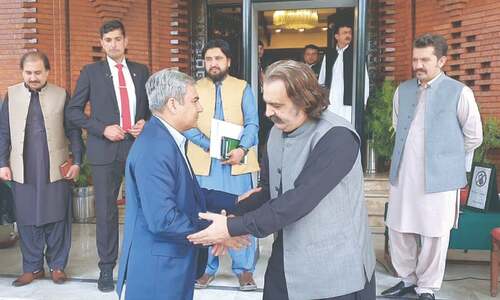THE deadly terrorist attack targeting Chinese workers in Bisham last month has clearly caused a stir within the civilian and military leadership.
Yet while the incident captured global attention as foreigners were targeted, the fact is that hundreds of Pakistanis have been losing their lives to militant violence, particularly in KP and Balochistan, in the ongoing wave of terrorism. In view of this grim reality, the prime minister on Friday decided to take the bull by the horns and himself oversee the national counterterrorism effort.
Shehbaz Sharif called for regular audits of security SOPs, while reiterating the state’s resolve to provide adequate protection to Chinese workers involved in various projects in the country. He also highlighted the need to improve the performance of provincial CT departments.
It is welcome that the prime minister has realised the gravity of the situation, and himself decided to address the threat of terrorism. But Pakistan at this juncture requires more than rhetoric and noble intentions to defeat the ogre of terrorism.
The complexity of the terrorist threat in the country requires a well-oiled counterterrorism machinery with sufficient autonomy to neutralise malign actors before they carry out their deadly plans. As mentioned, militants have kept up their campaign of terror with steady momentum, particularly targeting law enforcers and security personnel.
Just on Friday, a police officer providing security cover to a polio team was martyred in South Waziristan, while in Lakki Marwat, three policemen lost their lives in separate attacks. As per figures published in the media, there were nearly 100 militant attacks in February, and 93 in January, resulting in at least 177 fatalities in the first two months of the year. The state can ill afford to ignore these dire numbers.
With regard to the prime minister’s renewed resolve to fight terror, it should be stated that both the ideological basis — in the form of the revised National Action Plan — as well as the operational framework — in the form of Nacta — already exist to achieve this aim.
What is needed is the total commitment of the state to get the job done. This would require both the centre and the provinces, as well as the civilian and military arms of the state, to work in tandem in the fight against terrorism. As this paper has argued before, Nacta is the best forum for a coordinated response. The interior minister recently spoke of breathing new life into the agency; time is of the essence, and the sooner this is done, the better.
Moreover, along with kinetic measures, which are essential, the long-term solutions, as envisaged in NAP, to counter extremism and terrorism lie in deradicalisation and addressing the root causes — primarily injustice, poverty and deprivation — that compel ordinary people to join militant outfits.
Published in Dawn, April 7th, 2024














































Dear visitor, the comments section is undergoing an overhaul and will return soon.